|
|
|
Sort Order |
|
|
|
Items / Page
|
|
|
|
|
|
|
| Srl | Item |
| 1 |
ID:
116436
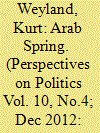

|
|
|
|
|
| Publication |
2012.
|
| Summary/Abstract |
Prominent scholars have highlighted important similarities between the Arab Spring of 2011 and the "revolutions" of 1848: Both waves of contention swept with dramatic speed across whole regions, but ended up yielding rather limited advances toward political liberalism and democracy. I seek to uncover the causal mechanisms that help account for these striking parallels. Drawing on my recent analysis of 1848, I argue that contention spread so quickly because many people in a wide range of countries drew rash inferences from the downfall of Tunisia's dictator. Applying cognitive heuristics that psychologists have documented, they overrated the significance of the Tunisian success, overestimated the similarities with the political situation in their own country, and jumped to the conclusion that they could successfully challenge their own autocrats. This precipitation prompted protests in many settings that actually were much less propitious; therefore problems abounded. Cognitive shortcuts held such sway because Arab societies were weakly organized and repressed and thus lacked leaders from whom common people could take authoritative cues. The decision whether to engage in emulative contention fell to ordinary citizens, who-due to limited information access and scarce experience-were especially susceptible to the simple inferences suggested by cognitive heuristics.
|
|
|
|
|
|
|
|
|
|
|
|
|
|
|
|
| 2 |
ID:
116298
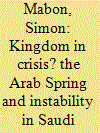

|
|
|
|
|
| Publication |
2012.
|
| Summary/Abstract |
While the revolutions of the 2011 Arab Spring deposed and replaced previously embedded autocratic regimes, the Kingdom of Saudi Arabia remained largely trouble free. This article examines how the ruling Al Saud family was able to prevent the violent manifestation of tensions within Saudi Arabia. It is argued here that through the process of state-formation mechanisms were created to ensure the stability of the regime, a framework initially intended to protect the regime from coup d'etats. The long-term application of coup-proofing strategies cannot successfully respond to the challenges emanating from non-military sources. This analysis concludes that the Saudi monarchy has avoided short-term instability, but longer-term pressures facing the Al Saud family necessitate domestic reform. However, regional dynamics, driven by fears of an expansionist, nuclear Iran, a changing regional balance of power, and an apparent American exceptionalism for Saudi Arabia, make this reform unlikely.
|
|
|
|
|
|
|
|
|
|
|
|
|
|
|
|
| 3 |
ID:
114444
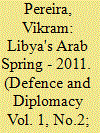

|
|
|
|
|
| Publication |
2012.
|
| Summary/Abstract |
In the 15th and the 16th centuries, the Barbary coast, a strip of North
Africa, known because of the Berbers, came under the scanner of
the two principal players in the Mediterranean at that time: namely,
Spain in the west and Turkey in the east. This rivalry lasted for much
of the 16
th
century but was subtly won in a fairly unorthodox manner
by the Turks who allowed Turkish pirates or corsairs to establish
themselves along the coast; the territories seized by the corsairs were
then given a formal status as protectorates of the Ottoman Empire.
The first such pirate established himself on the coast of modern-day
Algeria in 1512, followed by others (in what is today's Libya) in 1551;
Khair-ed-Din (popularly known as Barbarossa took over Tunisia,
very briefly in 1534, but the territories were recovered for Spain
in 1535 and finally brought under Ottoman control in 1574. P
|
|
|
|
|
|
|
|
|
|
|
|
|
|
|
|
| 4 |
ID:
131868
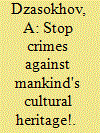

|
|
|
|
|
| Publication |
2014.
|
| Summary/Abstract |
Inter arma silent Musae (In times of war, the Muses are silent). This paraphrased ancient Latin maxim comes to mind now when the Middle East stretching from Libya to Iraq is in the grip of war. Its biblical regions, literally steeped in millennia of history and culture, are in the middle of a large-scale crisis caused by the 2003 aggression against Iraq and stoked by the so-called Arab Spring that started in 2011.
|
|
|
|
|
|
|
|
|
|
|
|
|
|
|
|
| 5 |
ID:
189778
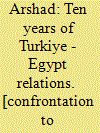

|
|
|
|
|
| Publication |
New Delhi, ICWA, 2023.
|
| Description |
68p.pbk
|
| Series |
Sapru House Papers
|
| Standard Number |
9789383445776
|
|
|
|
|
|
|
|
|
|
|
|
Copies: C:1/I:0,R:0,Q:0
Circulation
| Accession# | Call# | Current Location | Status | Policy | Location |
| 060339 | 327.561062/ARS 060339 | Main | On Shelf | General | |
|
|
|
|
| 6 |
ID:
111723
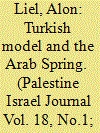

|
|
|
|
|
| Publication |
2012.
|
| Summary/Abstract |
As the outcomes of the Arab Spring of 2011 take on more clarity, particularly in Tunisia, Libya and Egypt, two central forces appear to be leaving their impression on the emerging regimes: Islam on the one hand and democracy and liberalization on the other. Religion is definitely in fashion in the Middle East, but democracy and modernization are also influencing the area, mainly through the revolution in communication. Clearly there is no way they can be ignored or negated. Throughout the Muslim world, Islam is perceived as an element that educates, unifies and preserves tradition, whereas democracy-modernization is seen as the means to improving, developing and above all creating livelihoods.
|
|
|
|
|
|
|
|
|
|
|
|
|
|
|
|
|
|
|
|
|